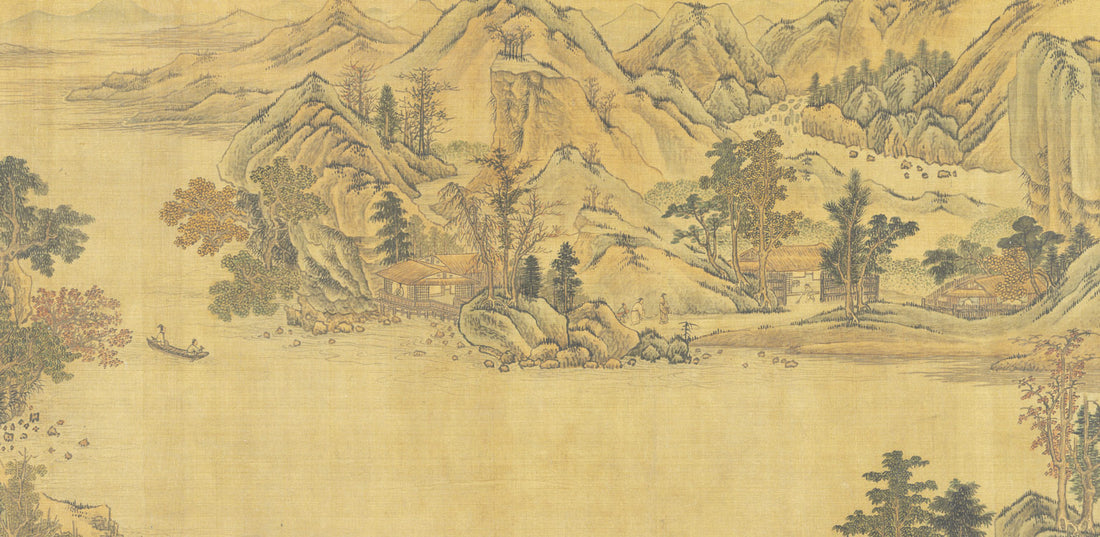
DIGEST | Poetry of Wei Ying-Wu
Scene: You cold brewed your tea overnight, and it's strained and ready to drink with ice. Or, your hot brew: some of us really do drink hot tea all year round. But returning to our scene: the AC unit is running as you sip your tea, but something is missing...yes, it's the poetry.
Luckily, Garrett has you covered with three poems by the Tang dynasty poet Wei Ying-Wu (韋應物). Moody, atmospheric, and full of landscapes and portraits of everyday life, Wei Ying-Wu's poetry is perfect for summer tea drinking. We like them best in the countryside or on the beach, but they also work as an elevated form of escapism...we can confirm.
And in case you needed summer teatime curation, here are a few of our favorite items.
Wei was serving his government job in the city of Ch'ang-an during the late summer of 781. Writing in response to his cousin, Wei Tuan, he expressed his longing for Tuan as he regretted leaving his countryside hut.
In Reply to Tuan
In suburban gardens summer rains have stopped
green shade spreads across vacant yards
working in an office doesn’t do any good
and goes against my love of seclusion
suddenly I see your image before me
and the sadness of separation fills my heart
especially when I feel the cool evening air
and hear the din of cicadas
答端
郊園夏雨歇 閑院綠陰生 職事方無效 幽賞獨違情
物色坐如見 離抱悵多盈 況感夕涼氣 聞此亂蟬鳴
In the summer of 779, Wei visited the village east of town and expressed his admiration for his hero T'ao Yuan-ming (365-427), a poet who left his government job to retire to a village in the country.
East of Town
Stuck in an office all year
I left the city for the wide-open dawn
where willow catkins soothed the wind
and blue mountains stilled my cares
where everything green put me at ease
where I followed a stream and followed it back
where a light rain covered a flowering plain
and spring doves were calling unseen
I keep suppressing my love of seclusion
I'm invariably busy at work
but someday I'll retire and build a hut here
to be like Old T'ao would be sweet
東郊
吏舍跼終年 出郊曠清曙 楊柳散和風 青山淡吾慮
依叢適自憩 緣澗還復去 微雨靄芳原 春鳩鳴何處
樂幽心屢止 遵事跡猶遽 終罷斯結廬 慕陶直可庶
Written in the spring of 781, Wei wrote to his past government colleagues magistrate Han and Secretary Lu, echoing the idea that the lack of contribution working for the government should be replaced by retirement in the countryside.
Walking Late In My Garden: To Magistrate Han and Secretary Lu in Chaoying
Farmers have already started to plow
thick smoke is rising from their yards
birds are singing sweetly from garden trees
being retired I was still asleep
unaware the day was so late
I got up and gazed at the azure sky
I stretched my limbs
and felt happy indeed
then I went back below thatched eaves
poured some wine and considered fine men
adjusting their belts on their way to the office
with nothing but documents to fill their days
wishing they were here in the woods
enjoying the sight of mountains and streams
unless you're living in enlightened times
why not work on yourself instead
園林晏起,寄昭應韓明府、盧主簿
田家已耕作 井屋起晨煙 園林鳴好鳥 閑居猶獨眠
不覺朝已晏 起來望青天 四體壹舒散 情性亦忻然
還復茅檐下 對酒思數賢 束帶理官府 簡牘盈目前
當念中林賞 覽物遍山川 上非遇明世 庶以道自全
Poems selected by Garret Long
Translated by Red Pine. In Such Hard Times: The Poetry of Wei Ying-wu, Copper Canyon Press, 2009

Lu Hong (盧鴻), "Ten Scenes of a Thatched Cottage", Tang Dynasty, National Palace Museum of Taipei.
Title Painting: Wang Wei (王維), "A Thousand Crags and Myriad Ravines", Tang Dynasty, National Palace Museum of Taipei.
